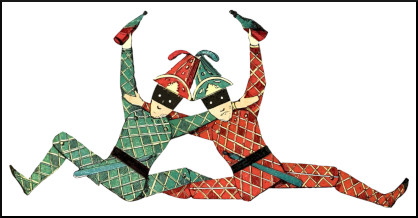John S. White? F. J. Finch? Glenn Franc? E. Stanley Jones? Orval Hobart Mowrer? Harry Emerson Fosdick? J. P. Allen? Zig Ziglar? Bruce Norman? Susan Glaser? John C. Maxwell? Jerry Sternin? Millard Fuller?
Question for Quote Investigator: In self-help and motivation books I’ve encountered the following saying:
It is easier to act yourself into a new way of thinking, than it is to think yourself into a new way of acting.
This remark employs a rhetorical technique called chiasmus. The first phrase is repeated while some of its words are cleverly re-ordered. Would you please explore the provenance of this expression?
Reply from Quote Investigator: This adage belongs to an evolving collection of expressions with changing vocabulary that each employ chiasmus. Here is a sampling with dates. The phrasing varies, and these assertions are not all logically equivalent:
1930: easier to act yourself into right thinking than to think yourself into right acting. (Spoken by John S. White or F. J. Finch)
1932: easier to live yourself into right thinking than it is to think yourself into right living. (Attributed to Glenn Franc)
1937: easier to act your way into right thinking than to think your way into right acting. (E. Stanley Jones)
1959: easier to act your way into a new way of thinking than to think your way into a new way of acting. (Anonymous)
1959: easier to act your way into a new way of feeling than to feel your way into a new way of acting. (O. Hobart Mowrer)
1961: easier to act yourself into a new way of thinking than to think yourself into a new way of acting. (Attributed to E. Stanley Jones)
1965: easier to act yourself into a new way of feeling than to feel your way into a new way of acting. (Attributed to O. Hobart Mowrer)
1969: easier to act your way into new ways of thinking than to think your way into new ways of acting. (J. P. Allen)
1979: easier to behave your way into a new way of thinking than to think your way into a new way of behaving (Called “Kegley’s Principle of Change” by John Peers)
The first saying in this family was employed in 1930 during a Sunday School Convention held in Nebraska. The two main speakers were John S. White, general secretary of Nebraska, and F. J. Finch, educational director for the Methodists of Nebraska. The local newspaper reported that one of these gentlemen employed the saying, but the precise orator was unidentified. Boldface added to excerpts by QI:1
Much food for thought was left by these men in statements such as “It is easier to act yourself into right thinking than to think yourself into right acting.” “Stop preaching religion and live it, practice it in your everyday life.”
Below are additional selected citations in chronological order.
Continue reading “Quote Origin: It’s Easier To Act Your Way Into a New Way of Thinking Than To Think Your Way Into a New Way of Acting”






